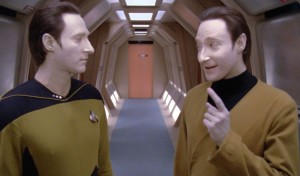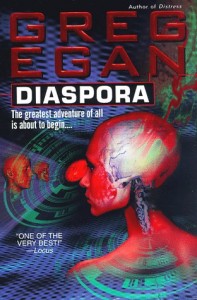 Speaking of Among Others, I had an interesting conversation with Anaea Lay about the ending when we were at WorldCon.
Speaking of Among Others, I had an interesting conversation with Anaea Lay about the ending when we were at WorldCon.
Warning, here there be spoilers.
One of the things that you notice as you’re leaving religion is that almost nobody acts like they believe in an afterlife. With few exceptions, no one acts like it’s going on to the next stage of life – like going through puberty, or moving to a different city. Everyone treats it like it is the annihilation of a human soul. It’s one of the clues that tips off observant children that this whole religion thing is probably bullshit.
As I mentioned in my book-club review, there’s two ways to read Among Others. One way is as a fantasy, that actually contains fairies and ghosts and magic. The other way is as the story of a girl struggling with mental illness. Specifically, she’s written as someone who is succumbing to schizophrenia, in a family with a history of schizophrenia. I’ve been told that Jo Walton based many of the things that happened in the book on events in her life, as she did grow up with a mother suffering from schizophrenia. As such, there’s two ways to read the ending.
The naturalist reading is a triumph. Mor overcomes her mental problems and doesn’t commit suicide. She goes on to live a happy, prosperous life as a Sci-Fi author.
The supernaturalist reading is a horror story. Mor casts her sister half-mauled into some unknown afterlife, having robbed her of the chance to be eternal and happy as a fairie, with the knowledge of magic running in their veins. She chooses instead to go be with her new boyfriend.
As was pointed out by Anaea, it is akin to having a choice between moving to a different country with your sister, or delaying moving to that country for a few decades so you can hang out with your new crush and knowing that this will cause you sister’s legs to be crippled and her left arm amputated. Sure, it sucks that you’re forced to make that choice. In an ideal world you wouldn’t have to choose between your new romance and your sister’s limbs. But once you’re in that position, there is NO WAY that not saving your sister is the correct moral choice.
This did not occur to me, because I was committed to the naturalist reading. But this also did not occur to Jo Walton or almost anyone else who read this with the supernaturalist view, even though it should have. Because just like all the religious people out there who profess to believe in an afterlife but still treat it as annihilation, the characters in the story act like there is no afterlife. In a world with no afterlife Mor’s choice was correct, and most readers in this world cannot suspend that feeling even when we’re presented with a world in which there IS an afterlife. We still react as if there isn’t one.
(It’s similar to how many readers of Movement couldn’t get past the fact that autistic children require compassion and acceptance in OUR world to realize that not treating them in a fictional world where a treatment is available is immoral, as I argued).
I consider this another good reason to stick with the naturalist reading of the book. I prefer to have a heroine that is strong and relatable, rather than an amoral beast.








